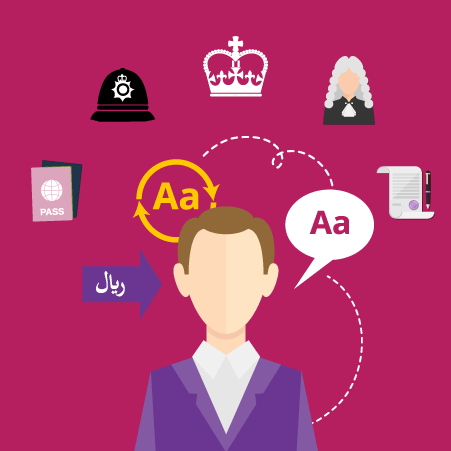In December 2019 I decided that I should transform my hobby and passion for languages into something serious and get a qualification. This is how my journey started. Before telling you more, allow me to introduce myself – I am an economist with a PhD in Management and an entrepreneur. Languages, however, play an important role in my life and knowing a few has been extremely important for everything from my personal life to success in career.
As you can imagine, I have passed an impressive number of exams and tests, but DPSI was still a major challenge and I am writing this to help you pass it as I did.
DPSI is a qualification for those who work, or would like to work as an interpreter, in one of these areas:
· Law: courts, solicitors, immigration
· Healthcare: hospitals, clinics, GP practices
· Local Government: housing, social work, education.
Choosing the right course
You could go directly for the exam, but I would rather recommend paying for a course. Why? Because it gives you a direction and a structure for studying. It also offers plenty of exercise and studying materials that will help you in your efforts.
I have made my research and chose the ISL one because of their flexibility.
Be disciplined, committed and work hard
It is not going to be easy, so first thing is planning. You need to allocate time and energy for studying on a regular basis and be very disciplined about it. Start by allocating 4 to 8 hours weekly to focus on your lessons.
The test is very technical and you need to start learning the right vocabulary at least three months in advance. If you go for the Legal one, like I did, Netflix British Police Series did help. Also read the news in both languages and as many articles possible in both languages. You may also consider radio and podcasts.
Practice recording your own voice
You can download app that can record your voice. You can record yourself interpreting (Units 1 and 2) or doing sight translation (Unit 3) and either have a friend listen to your interpretation or go back and listen to yourself. This can be really helpful! When you listen to yourself you will notice things such as say filler words (um or uh or like) and you can try and fix that. You can also acknowledge how fast or how loud you tend to speak. Speaking loudly and clearly will improve your score.
Build up dictionaries and glossaries
Bear in mind that you are allowed to take any paper dictionaries and any glossaries that you compile yourself! So, work on it and create useful glossaries for the big moment. I had a lot of personal glossaries that had most of the terms I thought I would need. I had a bilingual dictionary that proved very useful.
I also had the Oxford Dictionary of Law, which defines terms in English. I practiced translating with dictionaries four times to make sure I was giving myself enough time to flip through the dictionary and write neatly.
Work on your glossaries continuously: while you are reading, watching a film or listening to the radio. Add new words and practice.
Practice in exam conditions
I strongly advice you to buy previous years test and practice in an exam like environment. It is very important to practice using pen and paper because on the test day, many candidates get nervous. The more we practice writing in an environment similar to the test, the more we can reduce pre-test nerves. Time yourselves and practice, practice, practice!
No time for drafts during the exam
For the translation units (Units 4 and 5) you DO NOT have enough time to write a first draft, so forget about it
Use a sheet of paper for ideas and words that you want to check in the dictionary, and separate paper to write your translation as neatly as possible. If you try and rewrite your exam, you might run out of time!
When your test paper looks neat, the examiner is more likely to give you a good score!
Read the HANDBOOK
You MUST read the handbook in order to understand the test. So read it, reread it, and make sure you are prepared for the test.
It helped me enormously related to what I could expect.
Choose a study buddy
This is the most important thing and it has helped me enormously. I would say that it was the key factor. Try to find someone who aims at passing this exam, someone with a similar studying style and the same level of commitment and will to succeed. I was lucky enough to find such a person on the chat platform of ISL and it was a great achievement. Together we managed to have a study routine, we practiced with previous tests. We systematically worked on vocabulary and tested each other.
Me and my study buddy, we became life time friends and business partners. We now manage together a new, but already successful translation and interpreting company called AllSo Ltd. We are currently looking for committed linguists so send us a CV if you want to take part in our new journey.
